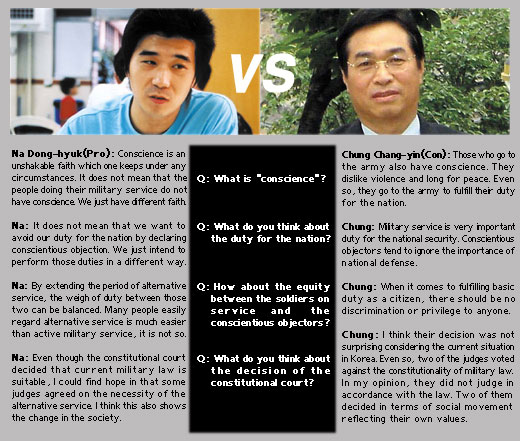Pioneers for peace or heretics of society?
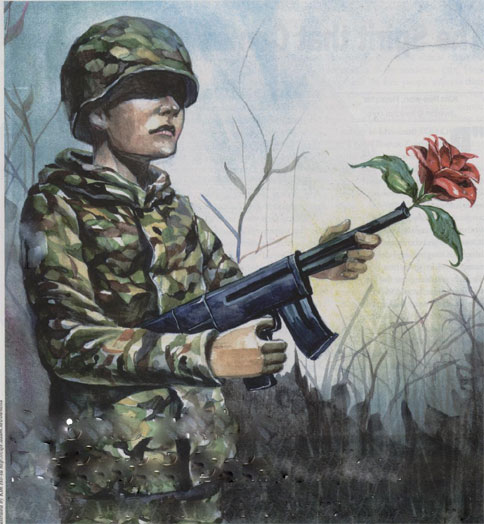 | ||
| ▲ Illustrated by Kim Ho-su | ||
Who are the conscientious objectors?
Conscientious objectors to military service are those who object to joining the army or to being involved in any kind of war or violence from their religious belief or conscientious reasons. Approximately 10,000 people have been accused of being the conscientious objectors until now, and about 600 people refuse to do military service every year declaring conscientious objection. According to the statistic of the briefing for the 60th Session of the UN Commission on Human Rights issued in Feb, 2004, now 521 conscientious objectors are currently imprisoned in Korea.
Most of the conscientious objectors are Jehovah's Witnesses. Jehovah's Witnesses tend to follow the life style of the first Christian generation, and oppose any type of violence or war. They regard God as the only one who has control over life or death, and humans should not damage other living things. "Some people think that we deny the existence of nation, but it is not true. We want to fulfill our duty to the nation keeping our faith," says Son In-chul, a Jehovah?s Witness.
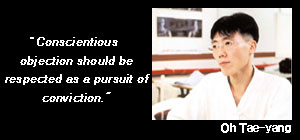 | ||
Conscientious objectors used to be punished with the charge of mutiny or evasion of military service under the Korean Military Service Act. Until the middle of the 1990s, conscientious objectors were subject to repeated punishments for the same offense and were sentenced to over three year-imprisonment. Since 2001, conscientious objectors started to be tried in civil courts of law, not in the military court of law, and have got the minimum sentence like one year and a half. In 2002, Article 88 of the current Military Service Act was required to review the constitutional court. Article 88 says, "Any person who avoids joining the army without any proper reason after the day he gets military notice from the nation should be punished under the law," After the punishment, the conscientious objectors face strong obstacles in society. "Conscientious objectors are often treated as criminals in society. Since we become ex-convicts after the imprisonment, we cannot even easily get jobs," says Kim.
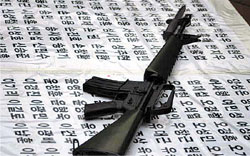 | ||
| ▲ People who chose imprisonment instead of holding firearms | ||
The disputed points
When it comes to conscientious objection, there are some disputed points. The concept of conscience is differently defined by the pro and the anti-conscientious objectors. "Conscience of the objectors is partially religious and personal belief so that society does not have to protect their belief," says Chung Chang-yin, Dr., of Korea Security Research Center in Korea Veterans Association. On the contrary, "conscience is the unshakable faith which I pursue during my lifetime and this is worthy enough to be respected in this society," says Oh Tae-yang.
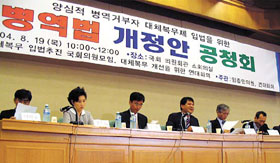 | ||
| ▲ Public hearing for amendment of Military Service Act | ||
The duty for the nation is differently acknowledged between two groups as well. "The duty of national defense is so divine that it cannot be substituted," says Chung. Further, an alternative service does not make sense because alternative means to choose one thing among two which holds the same value. However, military service conveys more divine value than any other kind of activity because it is at the risk of one's life. On the other hand, conscientious objectors argue that the duty of national defense can be substituted by alternative service. "To protect our country is as important as to develop the inner side of the country. For that reason, conscientious objectors should be accepted to work in the social welfare organization instead of military service," says Im Jong-in, a member of the National Assembly. "To implement the alternative service well, we can balance the equity between going to the army and serving for the alternative service," says Oh.
Alternative public service
Alternative service is often discussed as an another opportunity of fulfilling duty by the conscientious objectors instead of military service. Alternative public service is to work in areas such as transporting the patients, helping the physically challenged people, and solitary senior citizens to name a few. "Alternative service is not a totally new concept. About 140,000 men who have physical or mental deficiencies or quality of academic achievements, etc. work in public administration and designated enterprises for 28 to 36 months, including 4 weeks of basic military training. What we want is to apply the alternative system without 4 weeks of basic military training," says Na Dong-hyuk. Even though conscientious objection was not admitted legally in the Supreme Court and the constitutional court, over half of the judges agreed that alternative public service is necessary under the current military system in Korea. Along with these judgements, an Assemblyman, Im Jong-in tries to legislate alternative public service law in the National Assembly and held a public hearing on August, 2004.
Legislation of an alternative service is being tried as a way of changing the current military system. "There are many irrational things in Korea?s current military system. Among them, the most urgent matter is conscientious objectors. For them, alternative service is necessary," says Im. The principles of this legislation are those three things: equity, national defense, and welfare in the army. "People often oppose the alternative system because active military service is too hard to perform. Active military service is hard because of the inferior human rights and welfare condition in the army. It is one of the purposes of this legislation to improve the welfare and human rights situation in the army as well," Im continues.
In his legislation, there is a plan to establish a committee which can ascertain the real belief or not. Conscientious objectors should do public service for three years, and there will be a process of re-examination on their belief in the middle of the service. "In my opinion, public opinion has become positive about the conscientious objection and alternative service. For that reason, I am quite optimistic that a new law concerning alternative service will be passed within the 17th term of regular assembly meeting," says Im.
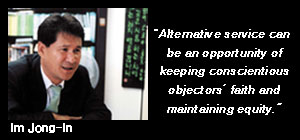 | ||
In foreign countries
Freedom of conscience is one of the human rights guaranteed by the UN (United Nations), and conscientious objection is admitted as a revelation of freedom of conscience in many foreign countries. "Conscientious objection is not a new concept at all. It has existed for a long time throughout history. For example, when a scientist refuse to perform a dangerous experiment, it is conscientious objection as well," says Na Dong-hyuk. In foreign countries, conscientious objection to the military service has been admitted as a kind of conscientious objection, although it is a relatively new concept in Korea. UNCHR (United Nation Commission on Human Rights) admitted the right of conscientious objection of human-beings in 1989 and tried to set the standard of conscientious objection. A reason for admitting conscientious objection lies in ICCPR (International Covenant on Civil and Political Rights) article 18, which says "Everyone shall have the right to freedom of thought, conscience and religion." Conscience of conscientious objectors is being admitted as legally accepted right. Along with these trend, 109 countries admit the right of conscientious objections while 48 countries deny the right.
Among the countries, Germany and Taiwan are regarded as countries where alternative public service systems have been adopted well. In Taiwan, alternative public service was discussed as a means of improving social welfare and adopted in 2000. Even though Taiwan is in a similar situation like Korea under the threat of China, conscientious objection has been accepted and an alternative system has further improved the social welfare system. Conscientious objectors in Taiwan work in various fields related to social welfare, such as medical service, environment conservation, and education. Both in Germany and Taiwan, the social welfare system has been improved quite a lot after adapting an alternative public service system, according to Choi.
A society in need of embracement
"I got to understand the conscientious objectors while meeting conscientious objectors for making a movie. Even so, I think I cannot do what they do considering they face the prejudice and discrimination from the society," confesses Kim Hwan-tae, a director of the documentary movie for conscientious objectors in the documentary. Even though conscientious objectors suffer from the bias and have spent several years in prison, they are struggling to pursue their faith. Voltarie, French Philosopher said "I disagree with your opinion, but I respect your right to speak against my opinion," In our society, different opinions have been ignored and the right to speak against the majority has been deprived. As society gets mature, tolerance which grants diversity and difference should spread among people, and conscientious objectors should be viewed in this sense.
